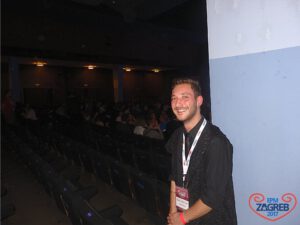Network Commissioner for 57th Agora AEGEE-Europe

Enes Furkan Kurt couldn’t help being mesmerized by AEGEE when he went to his first Summer University, just like it happens to many of us. Since then, Kurt began to develop himself inside his antenna and also internationally, attending events and becoming a crucial part of his board. Now he dreams of becoming the next Network Commissioner, and The AEGEEan brings you his proposals and motivations.
Tell us a bit about yourself. What’s your AEGEE story and made you join?
I’m a 25-year-old Master Student living in Istanbul for 7 years. I am fond of travelling, as all AEGEEans are, gastronomy, movies, series and sports. I joined AEGEE in 2014 September via advice from one of my friend. My first event was a Summer University in Spain. That made me addicted to and more curious about AEGEE, so I kept on visiting events and conferences. These helped me establish many connections in Europe, some of them are quite strong too. After I became active at the local level with my first board position as Vice-President, I realized that I could be more helpful for my local. I had a chance to work as treasurer of Agora Istanbul and one week after Agora ended, I got elected as president of my local. I think what kept me in AEGEE was that you can always find a way to add something more on what you have done before.
Network Commission is arguably one of the most prestigious positions in the entire organization. However, the NetCom job is highly challenging. What motivated you to submit your candidature?
My first motivation was my background. I believe that I am capable of taking this challenge in my life. I became a member five years ago and I decided that I would contribute more to AEGEE with my experience. My second motivation source was friends. After I started to think of candidating, they always inspired and motivated me to go for it. So here I am!
What are some current policies or projects in AEGEE-Europe do you disagree with and why?
a) Action Agenda: I find this hard for locals to implement. In my opinion, some locals are not quite close to Action Agenda to organize events. Moreover, Action Agenda Committee is not sufficiently working recently.
b) Antenna Criteria: There are a lot of criteria which locals have to tackle to fulfil. Statistically, there are many exceptions from locals asked.
Do you have a preferred Network Area? What would you do if you’re appointed to another?
My preference would be the area I belong to now. However, I am cool with other areas because I think that I have enough European Level experience and am ready to elaborate with each member/local. I also hope that I can learn much more things than my expectation in this way.
Regarding your motivation speech, you mentioned that solving some problems that you’ve noticed in your Network during years is one of your aim purposes. Which are the most common problems that you have observed and why do you reckon they persist?
There are many aspects of the whole Network. There are projects, events, conferences, local activities ongoing. So I believe that it is sometimes not easy to follow each path that AEGEE offers us. Regarding these, for me, there is a local identity problem. Specifically for the newly settled locals, it is a challenge to catch up with everything at the same time. Processing finding local identity faster and staying active could be one problem. Another problem I have observed is a shortage of participation in some events. The more participant the events have, the better the outcomes of them are regarding creating space for diversity. I would also like to tackle this. Finally, I would say that bringing locals closer is not easy sometimes considering timing. So I would work on the importance of exchanges to make them more obvious and known, externally.
We’ve seen that you highlight the importance of LTCs in the program, and you’d also wish to create contentful training courses. What would they consist in primarily?
The first step should be asking locals. An LTC is the best way you can actually train members of locals inside the area. This is why an LTC should be based on what locals need. Regarding those needs, the program may be scheduled easily. Health indicators, in this way, give the chance to schedule better. LTC, for me, should include sessions about how correctly achieve the PR Strategy for external and internal activeness and awareness, Erasmus+ to discuss actually how locals can benefit from it and start issuing with, youth participation which is especially this year a hot topic but should be always, and youth development to help participants act.
You really focus on feedback between local antennae to see the strengths and weaknesses and inspire each other, and you also talked about simplifying the NetCom’s data. How would you decide which information is more important and how would you collect it?
All information is important. However, it depends on how frequently locals use them. Locals have to find out about the data, especially when it is related to a specific topic. First, I would make a common data pool in “areas” as they are supposed to have similar values (Of course, it should have a trial period in the beginning.) To collect strengths and weaknesses, there are many ways but the basic one in my mind is to implement SWOT analysis in a more efficient way. Then we can see which data can be used for some statistics and requests.

